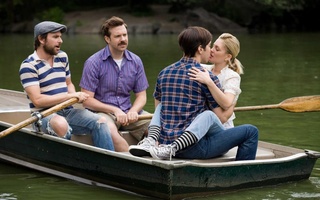
Dr. Leah Garrett, professor at Monash University, discusses her research on Jewish American war novels of the 40's, particularly the groundbreaking presentations of Jewish American soldiers struggling with antisemitism, masculinity, and identity within their platoons. Garrett's lecture was sponsored by Harvard's Mahindra Humanities Center.
Leah Garrett, a professor of Jewish literature from Monash University, addressed a packed room of graduate students and Jewish literature enthusiasts Wednesday about Jewish-American war novels. Sponsored by the Jewish Cultures and Societies Seminar and the Center for Jewish Studies, the talk focused on five best-selling novels from 1948, including Norman Mailer’s The Naked and the Dead and Irwin Shaw’s The Young Lions.
Garrett, whose grandfather and great uncles were Jewish American soldiers, had both personal and academic motivations when she started her research. After she took a professorship in Australia in 2008, she explained that she became more interested in what it meant to be an American than when she was living in the States. The thesis of her talk—and of her upcoming book—is that Jewish American writers possess a unique perspective on World War II.
“I discovered quite remarkably that virtually all of the best-selling novels about World War II in America, except for James Jones, were by Jews and were about Jewish soldiers,” she said. “There’s this huge story that has never been told because everyone focuses on the Holocaust.”
Garrett moved away from the canonical works of Philip Roth and Saul Bellow and instead focused on literature that was part of popular culture, which consequently had a direct impact on how postwar Americans understood the war effort. She explained that these authors were trying to emphasize the endemic anti-Semitism and racism in WWII and hoped to teach Americans that pluralism was the ideal.
Garrett shared anecdotes gleaned from archival research about how author Norman Mailer allegedly only went to war so that he could write the “Great American War Novel,” and how he encouraged the recipients of his letters to save his musings for future writings.
Eric M. Nelson ’99, Director of the Center for Jewish Studies, praised both the nature of the lecture and Garrett’s understanding of an understudied period in Jewish American literature.
Samuel E. Milner ’13, who is writing his thesis about World War II on the home front, was attracted to this lecture because he has read later period Jewish American wartime novels but was curious about this genre with respect to the 40s.
“In the later period, novels would ask: What is a rabbi doing in the middle of the army base? How does that work? But this period is back to basics—how does a Jew become an American?” he said.
Read more in News
MIT Professor: Exoplanet Research Is a Burgeoning FieldRecommended Articles
-
Weekend Fest to Promote Black ArtistryBilled by organizers as "one of the most important [events] in Black Harvard's history," a weekend celebrating black artistry--and attempting
-
 ‘Going The Distance’ Is A Bad Idea
‘Going The Distance’ Is A Bad Idea -
Novelist Irving Brings Humor to Morris Gray Lecture“To find a novelist with such nuance and precision, one would perhaps need to return to Dickens or James.”
-
Grossman Discusses Israeli LiteratureIsraeli novelist and political activist David Grossman shared the stories that influenced his latest award-winning novel, “To the End of Our Land,” at a guest lecture Tuesday night.
-
Portrait of an Artist: Tom PerrottaWriter Tom Perrotta talks with us about his numerous novels and feature film adaptations
-
A TV series that always pays its debtsIn an audience of fans—of both the novels and the program—it would be hard to find a person left unenthused by the next installment of the saga.













